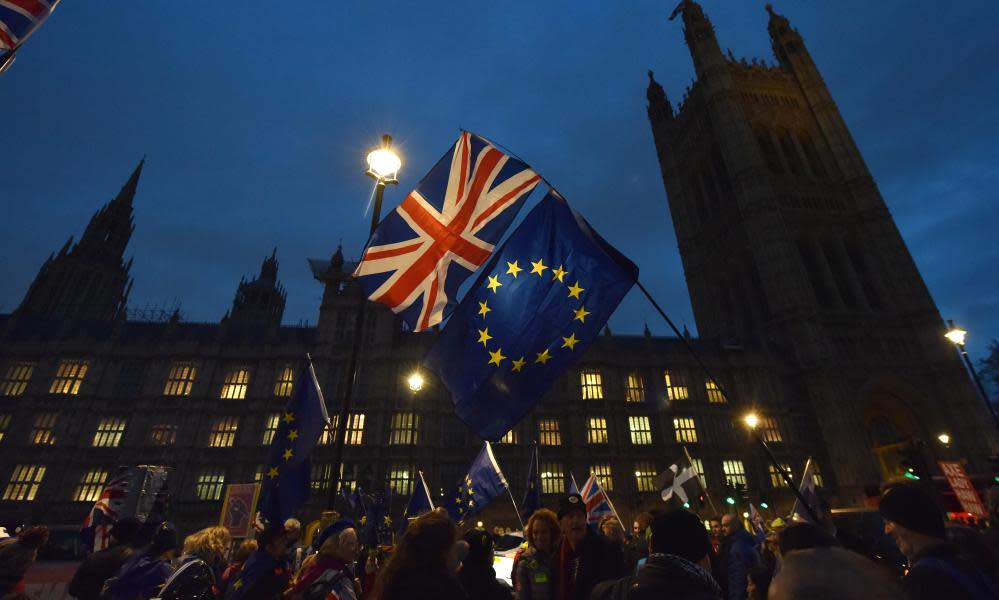Theresa May needs to realise she can’t keep every Tory happy

The House of Commons has spoken but what has it actually said? A clear and resounding “no” to a complex deal the UK and the EU have spent nearly two years negotiating. And behind the emphatic no lies an unlikely coalition of hard Brexiteers, ardent remainers and those in between, collaborating to kick the deal – and the prime minister.
Unfortunately, the kick was directionless.
There were loud cheers from outside Westminster when news of the result of the meaningful vote was relayed live to a surging crowd of remainers. They read the vote as providing the rationale for a second referendum, which they believe would keep them inside the EU.
The DUP and hard Brexiteers cheered too – for very different reasons. They do not want a second referendum and do not read this result as a rallying cry for one. For them, the withdrawal agreement and political declaration will not deliver their vision of a future for the UK in a world of wonderful opportunity. Their rejection of the deal is a demand for a renegotiation. Specifically, the DUP insist on ditching the backstop, saying it is unnecessary, despite farm and industry leaders in Northern Ireland welcoming Theresa May’s deal as a good option. Public opinion overall in Northern Ireland, which appears in favour of the backstop, is not reflected in Westminster. It is notable that Lady Sylvia Hermon, an independent unionist from Northern Ireland, voted in favour of this deal.

So we are where we are, but we don’t have the option of staying as we are. The UK is leaving the EU on 29 March – that does not change with the meaningful vote. The EU is watching the clock ticking and is making preparations for a no-deal Brexit. This week in Strasbourg discussions about those preparations took place, focusing on citizens, transport and financial services – noting that any contingency plans will not be as advantageous for citizens on both the EU and UK sides as what the withdrawal agreement would provide. Individual member states are also ramping up preparations, but no one relishes it.
But we are also mulling over the “meaningful vote” and trying to find meaning in it. To make 116 MPs happy with one simple solution, even if there was one, to reach the smallest majority in the House of Commons based on Tuesday’s vote, is a huge task.
Ditching the backstop as proposed by some would require the EU to rip out one third of the withdrawal agreement, leaving it lopsided and unbalanced. The objective of having no hard border on the island of Ireland is central to the withdrawal agreement, as are citizens’ rights and the financial settlement. Filleting the backstop will not happen. To do so would send shivers down the spines of many citizens in Northern Ireland and in my own constituency, which borders it, not to mention those across Europe who have been reassured by the EU standing up for the interests of a small member state.
It may be time for May to move on from the almost eternal internal debate and division in her own party over Europe and now over Brexit. She needs to realise that she cannot keep every one of her Tory colleagues happy.
Can a way and words be found to satisfy enough dissenters that it’s time to move on and facilitate an orderly Brexit? Appeals to Brexiteers fall on deaf ears. They are wedded to the cause and the sense that greatness awaits them in an EU-free world. The appeal, instead, must be to the moderates, including those who wish that Brexit would just go away. Can they accept that Brexit is coming and opt for an orderly planned Brexit – perhaps a softer one – rather than allow a chaotic and unplanned Brexit to happen by default?
All is not lost – just yet. We need a clear indication from the House of Commons on a positive direction towards Brexit. Time and patience is ebbing. There will be more twists and turns this week and next before sanity prevails, I hope.
• Mairead McGuinness is vice-president of the European parliament and an Irish MEP

 Yahoo News
Yahoo News 
